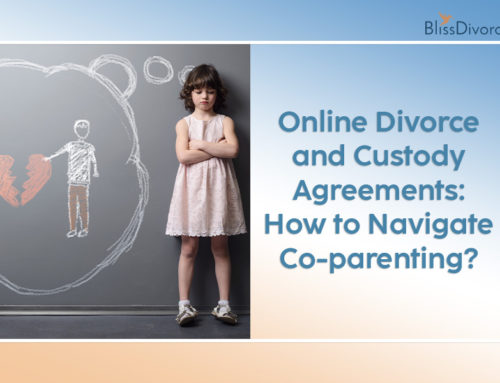Please note that all online divorce platforms are not the same. Much of the content below does not apply to BlissDivorce. BlissDivorce is the only complete online divorce solution, including property division, child custody, spousal support, and AI-powered Digital Divorce Mediation.
Negotiating the terms of your divorce online is not the same as traditional divorce. There are no attorneys, just you and your partner in the comfort of your own home.
An online divorce service gives you more freedom and flexibility to negotiate a fair settlement. Plus, if you and your partner work together, you will likely reach a fairer decision than letting the court decide for you.
However, are there rules on how to negotiate a fair divorce settlement online? What can you do as individuals to ensure you move on with your life and get the most out of your separation?
Let’s find out.
How to Negotiate a Fair Divorce Settlement Online With Platforms Other Than Bliss Divorce
Negotiating a fair divorce settlement online requires preparation, knowledge, openness, emotional regulation, and transparency.
A fair divorce is all about balancing two interests. While it might be hard for some, following these rules might make the process easier and faster.
- Avoid giving ultimatums or deadlines.
- Watch out for tricky divorce tactics.
- Make the full disclosure freely and voluntarily.
- Never re-negotiate points that have already been settled.
- Mentally prepare for every situation
- Focus on your children if you have any.
- Avoid getting personal.
- Ask why your spouse wants something, not what they want.

Source: shutterstock.com / Photo Contributor: AT Production
Before You Start Negotiating Your Divorce Settlement
Preparation before negotiating is key. So, before we dig deeper into the strategies for reaching a fair divorce settlement, let’s see how you can prepare for the ride.
Set basic negotiation rules
Set your ground rules, and devise a strategy and a plan. Divide your responsibilities, agree on behavioral rules, and set deadlines. Moreover, you should have a plan B if you can’t agree on something. With the flexibility of online divorce comes the possibility of getting stuck on an issue.
Discuss how you want to handle this kind of situation. Will you get an experienced mediator to lead you to the solution, or will you consult a lawyer and pay thousands?
Ensure both of you accept the rules. Find out what is best for you instead of doing what works for others.
For instance, face-to-face meetings are not required for online divorce. However, you might feel more comfortable discussing complex divorce matters in person.
Gather and share financial information
The first step in every divorce is the Domestic Relations Financial Affidavit or DRFA. Simply put, you have to fill out forms with your financial information and meet deadlines.
Be truthful about your finances. Otherwise, you will give a head start to your spouse.
When your DRFA is ready, and you move on to negotiation, go through the key steps for dividing assets and debts.
Figure out your BATNA and WATNA
Knowing how to negotiate a fair divorce settlement online includes BATNA and WATNA as two key concepts. BATNA is the best alternative to a negotiated agreement, while WATNA is the opposite.
You have to figure out the best and worst-case scenarios before you jump into your negotiating process. You need to ask yourself what are the most important things you want as an outcome of the divorce and what you can live without.
Sometimes, a fair divorce settlement can be easily reached if you and your spouse exchange your BATNA and WATNA and see where you stand.
Stages of Online Divorce Negotiation
Each divorcing couple has a different agenda. Some prioritize child custody, while others focus on spousal support or asset division. There are also differences in the tactics for negotiating a fair divorce.
However, one thing is common for all divorces. Each one has to go through four major topics.
- Parenting time and plan
- Child support and other expenses
- Alimony and spousal support
- Asset and liability division
Negotiating parenting time and plan online
There are two types of child custody: legal and physical custody. Don’t rush to decide on the custody of your children. Talk about every aspect and future implication to avoid changing the child custody agreement.
Be open to different parenting plans from the start. Know that you have to be flexible to have fair parenting time.
Talk openly about parenting time. First, decide which type you will have in your divorce settlement; it can be open, with a schedule, reasonable, supervised, or no visitation.
If you go with co-parenting, discuss using online tools for tracking parenting time with your partner. One of the benefits of using such tools is that you will have all the details about your parenting time in one place, including the time each parent gets with the children.

Source: shutterstock.com / Photo Contributor: fizkes
Negotiating child support and other expenses online
Set your selfishness aside when negotiating child support and other child-related expenses. Don’t see the issue only from a financial perspective and as a burden to your budget.
Think about your kids and their well-being. What is best for them, and how can you make separation easier for them? At the end of the day, your children need two parents rather than a ton of money.
Negotiating alimony and assets division online
One of the main motivations for negotiating alimony online should be avoiding trial. To ensure fair spouse support, you need to start by evaluating your resources.
Make a detailed overview of your separate and marital assets, income and expenses, benefits, and other sources of income. Try to divide the assets according to your needs peacefully.
If you are getting a divorce in California, consider temporary support until your divorce is settled.
Tips for Successful Online Divorce Negotiation On Platforms Outside Of Bliss Divorce
Start with small victories
Getting a divorce is a challenging experience. It might mentally drain you if you don’t know how to handle it.
Hence, the first things on your divorce planning checklist should be small things you are certain you and your spouse will agree on.
For instance, discuss your divorce strategy. You will most likely agree to avoid trial and have a peaceful divorce that won’t empty your wallet.
Starting with the simple things will encourage you to continue until you settle. You will transition from a place filled with fear from the divorce to a situation where you are confident everything will be in order.
After the small victories, you can move on to your priorities with the mindset that you are capable of settling. Identify and prioritize your most crucial issues.

Source: shutterstock.com / Photo Contributor: Andrii Yalanskyi
Use knowledge as leverage
Knowledge is power in negotiating a divorce. Avoid relying on your friend’s experiences and not consulting the actual law when struggling with something.
Don’t hesitate to explain the divorce process to your spouse if there’s something they don’t understand. A lack of information from one side can result in an unfair settlement.
If you choose BlissDivorce as your online divorce service, you won’t need to know all divorce laws by heart. In every section of your negotiation, there are handy tips that will help you make your divorce easier.
Lastly, you should know how to present your facts. Learn the value of everything you will divide. Make an assessment and list all the things worth negotiating for.
Be transparent
Being transparent and open throughout the whole negotiation process is important. You can build the trust you might have lost before you decided to get divorced.
If you’re transparent, it is most likely that your partner will appreciate your honesty and do the same. You will both be comfortable participating in the negotiation process and move on with your lives as soon as possible.
Trust is also built with your actions. For instance, to ensure a good start to the negotiation process, use the best way to serve your spouse the divorce papers.
Recognize your spouse’s perceptions and emotions
Consider the personality of your soon-to-be ex. How do they handle conflicts?
You can use your familiarity with their behavior to build a successful online divorce strategy.
Try to align with your spouse. While everybody can draft a quick divorce settlement, you can only reach a fair one if you and your partner understand each other’s perceptions and emotions.
Think about the things you are willing to sacrifice for a greater cause. Knowing your partner and their perceptions will make the negotiating process comfortable for both parties.
Focus on problems, not the person
Another way how to negotiate a fair divorce settlement online is by ruling out emotions.
Many spouses use emotional triggers for their benefit. While hiding your emotions from someone who knows you well is challenging, it is necessary for reaching a settlement that promises a better future.
Approach each setback in your negotiating process objectively. Separate the problem from your spouse. Focus on finding a resolution to the problem instead of worrying about emotions.
Every emotion you feel, including anger, resentment, and sadness, might cloud judgment and interfere with the process.
Ultimately, build your goals around your interest and not your position. Negotiating to fulfill your best interests gives you more flexibility. That way, you won’t endanger signing the divorce papers because you will have a firm position on a specific issue.

Source: shutterstock.com / Photo Contributor: Kaspars Grinvalds
Determining What Is Fair in Your Divorce
If you are a couple separating on good terms, your main goal might be getting what’s fair, not a penny more or less.
Splitting everything 50-50 might seem like an ideal divorce settlement, but that doesn’t apply in every divorce case. One of the benefits of online divorce mediation is that you and your partner determine what is a fair settlement.
How to negotiate a fair divorce settlement online according to your special circumstances?
Many couples take responsibility for their actions. For them, a fair divorce settlement is one where each partner takes separate assets and debts after the divorce instead of dividing them.
For instance, if you were saving money while you were married, while your partner did risky investments and spent a lot, splitting everything 50-50 doesn’t seem right.
*This article is for informational purposes only and is not intended to provide legal advice. If you require legal advice, please contact a licensed attorney in your local area.




